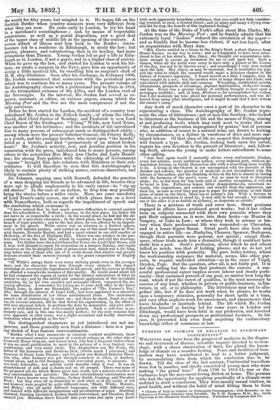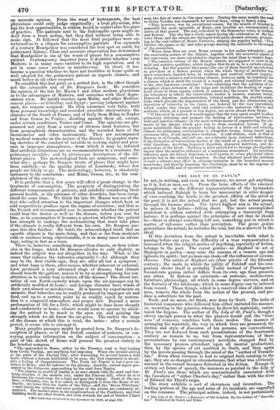BURGESS ON CLIMATE IN RELATION TO PULMONARY CONSUMPTION. * WHATEVER may
have been the progress of medicine in the diagno- sis and treatment of disease, scientific inquiry directed to meteor- ology, with a closer observation of facts, has placed the know- ledge of climate on a sounder footing. Peace and facilities of loco- motion may have contributed to lead to a better judgment, by accumulating data from which the conclusion was to be drawn. Till the close of the last century, Continental travellers were few in number, and chiefly consisted of young men who were making "the grand tour." From 1790 to 1814-15, war or dis- turbances kept the movement-loving Briton at home. The persons who had the opportunity for speaking practically of a climate were unfitted to draw a conclusion. They were mostly casual visitors, in good health, and without the habit of mind fitting them to form
• Climate of Italy in relation to Pulmonary Consumption; with Remarks on the Influence of Foreign Climates upon Invalids. By T. Il. Burgess, M.D., 8cc., lately Physician to the Blenheim Street Dispensary. Published by Longman and Co.
an accurate opinion. From the want of instruments, the best physicians could only judge empirically ; a local physician, who Las the best opportunities, is seldom found to undervalue his place of practice. The patients sent to the fashionable spots might in- deed form a truer notion but they died without being able to
make sign. It followed ;hat the most fatal prejudices were en-
tertained as to a climate for consumptive patients. For upwards of a century Montpellier was considered the best spot on earth for pulmonary disease. Close and accurate observation has determined that Montpellier is one of the worst of places for a consumptive patient. Contemporary inquiries leave it doubtful whether even Madeira is in many cases entitled to its high reputation, and is not in some cases useless or mischievous. In short, it has become a question whether we have not localities at home quite as well adapted for the pulmonary patient as regards climate, and much better in all other respects. To establish this last point as a settled fact, is the effect though not the ostensible aim of Dr. Burgess's book. He considers the opinion of the late Dr. Mason t and other modern physicians as to the advantages of Madeira, and coincides with their depre- ciatory view. He briefly touches upon Malta, and other Mediter- ranean places—as Gibraltar, and Egypt ; passing judgment against each, for reasons assigned. He then examines very fully, both from personal knowledge and recorded scientific observations, the climates of the South of France, and of Italy from Milan to Naples and from Genoa to Venice ; deciding against them all, except, under certain conditions, Venice and Como. The opinions are pro- nouneed not only from a survey of obvious local features, but from geographical characteristics, and the recorded facts of the thermometer and other instruments. They are accompanied by medical remarks on the nature of the disease; by graphic warn- ing sketches of the oonduct'of invalids in seeking sights and plea- sure in improper atmospheres,—from which it may be inferred that artificial attractions are no recommendation to a residence for pulmonary invalids ; and by picturesque descriptions of the dif- ferent places. The meteorological facts are numerous, and some- what dry ; perhaps Dr. Burgess treats of places that might have been omitted,—as the marshy plains of Lombardy, where few people are likely to go. The meteorology, however, is absolutely necessary to the conclusion; and Milan, Genoa, &c., to the com- pleteness of the survey. It is probable that a few years will effect egreat change in the treatment of consumption. The propriety of distinguishing the different temperaments of patients, and carefully considering their general health, or the presence of other disorders, has been recog- nized for some time. We think the late Dr. Mason was one of the I first who called attention to the important changes which heat or ' cold respectively produce upon the organs of secretion; and that as the French wit recommended you to ascertain whether the patient could bear the doctor as well as the disease, before you sent for him, so in consumption it becomes a question whether the patient has strength to undergo the acclimatizing that must take place if the climate is really different from his own. Dr. Burgess pur- sues this idea further. He holds the acknowledged truth that an equable climate is the main thing, and that so far from moderate cold or coolness being objectionable, it is in many oases an advan- tage, acting in fact as a tonic. There is, however, something deeper than climate, or than tuber- cles in the lungs, which Dr. Burgess alludes to only slightly, as indeed the subject was not altogether in his way. What is the cause that induces the tuberoles originally ?—for although they may be the first visible sign, they are after all but a symptom : and what hope is there, after causes, whether inherent or external, have produced a very advanced stage of disease, that climate should benefit the patient, unless it be by so strengthening his con- stitution as to enable him to throw off the disease? The direct irri- tation of our North-easterly winds upon the air-passages can be artificially modified at home ; and foreign climates have winds of their own almost as mischievous. It is known by experiments on animals, that tubercles can be readily produced by improper air and food, and up to a certain point be as readily cured by restora- tion to a congenial atmosphere and proper diet. Beyond a mere prolongation of life for a little, which might be done more cheaply and comfortably at home, climate would seem to operate by allow- ing the patient to be much in the open air, and gaining the strength which we all know the air gives. The earlier the stage of the disease at which this is tried, the better : after a certain period, it seems idle to attempt it. Many graphic passages might be quoted from Dr. Burgess's de- scription of places, or of the foolish conduct of patients, or con- veying popular information on the subject of consumption : a part of the sketch of Rome will present the greatest variety in the briefest compass.
"The approaches to Rome, either by the Florence road or that leading from Civita Vecchia, are anything but imposing: When the invalid arrives at the gates of the Eternal City, after traversing for several hours a wild heath without a human habitation to be seen, the first impression is invari- ably a feeling of disappointment. The Ports del Popolo is but a poor en- trance to Rome, and far inferior to the gloomy, desolate, ruined aspect pre- sented by the Coliseum, approaching: by the road from Naples. Th't? Pilgrim in search of health la at once struck with the sunk and low- tying aituaton of the modern city, under the Pincean hill, where he is to in ate his wanderings for a time and pass the winter. Parts of the ins- or Christian city, as it is called' to distinguish it from the Rome of an- tilluitY, are lower than the banks of the Tiber—still the 'flares
—and during the autumn d some portion of
undated. The markeut-mpla:in the neighbourhood.theolitinterparet;oonstaanilldy in-t
buildbig itself, are often flooded, and ven witds the end of October I have
His book was reviewed in the Spectator for MO, at page 352.
seen two feet of water in this open space. During the same month the road to Civita Vecchia was impassable for several days, owing to heavy rains.
"This, however, was an exceptional season, for the month of October is generally the most agreeable at Rome, and invalids are recommended to arrive at that period. The soil, refreshed by the September rains, is verdant and flowery. The city has a lively aspect during the celebration of the Oc- tober fetes, and the streets are thronged with gaily-dressed citizens, proceed. lag to the cool cellars of Monte Testaccio, singing the popular ballad, 'Viva Ottobre che sposso ci di,' and other groups dancing the esiterello to the sound of the mandoline.
"When these fetes are over, Rome returns to her sullen solemnity; and the enervating nature of the climate, together with the mournful aspect of her vast ruins, are more calculated to depress the mind than to inspire hope.
"The sanative virtues of the Roman climate are supposed to exist in its mild and sedative qualities; which implies that its air is, to a certain extent, relaxing. But this popular idea seems like one of those fanciful speculations so prevalent at a former period, when the whole theory of medicine was sheer conjecture, handed down by tradition and received without inquiry. Why should a sedative and relaxing climate, however mild, be beneficial for a disease which is itself the result of a torpid and vitiated condition of one a the vital functions—nutrition ? Even admitting that the mildness of at- mosphere allays irritation of the lungs and facilitates the healing of super- ficial ulcers in those organs, (which it cannot do,) the source of the disease, the laboratory in which the tuberculosis matter is formed, remains intact. Depraved digestion, malassimilation, vitiated nutrition, the morbid condi- tions which precede the degeneration of the blood, and the elimination and deposition of tubercles in the lungs, are fostered by the very ingredients which render this climate mild and sedative—the malarious effluvia and moisture which, in a greater or less degree, are never absent from Rome.
"If this view be correct, it would appear that the very agent sought to allay pulmonary irritation and promote the healing of tuberculous cavities—a mild and sedative climate—is the most certain means of engendering the ele- ments of the disease which give rise to these secondary lesions. It ap- pears indubitable that the popular feeling in favour of a mild and relaxing climate for pulmonary consumption is altogether wrong, being based upon erroneous data, if not upon mere tradition. A cold climate, such as that of Norway or of Canada, and still air, are evidently more rational indications, if the formation of tuberculous matter is the result of a relaxed state of the vital functions, involving impaired digestion, depraved nutrition, and de- generation of the blood. Nothing is more calculated to derange the digestive organs than the sedative influence of a malarious atmosphere. Its injurious influence upon the biliary functions is well known to every physician whose practice lies in the vicinity of marshes. So that whatever good the mildness of such a climate may effect in allaying irritation in the bronchial mucous membrane, and thereby lessening the circulation, must be at the expense of the general health and of disordered nutrition."



























 Previous page
Previous page